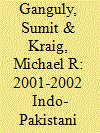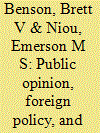|
|
|
Sort Order |
|
|
|
Items / Page
|
|
|
|
|
|
|
| Srl | Item |
| 1 |
ID:
069880


|
|
|
|
|
| Publication |
2005.
|
| Summary/Abstract |
Coercive diplomacy has long been seen as a viable alternative to war by political decision-makers. There is, however, a long line of credible academic and policy critique-stretching back to the Cold War-that asserts the failures of coercion almost always overwhelm its benefits. Our examination of the 2001-2002 Indo-Pakistani crisis supports the overall analytical consensus that coercive methods, under certain circumstances, accomplish little. We discover that India's use of coercive diplomacy was severely hobbled because of Pakistan's possession of nuclear weapons, strong Pakistani conventional forces, and other geopolitical realities that strongly favored Pakistan. Despite careful attempts by Indian elites to apply the principles of "forceful persuasion" to end the crisis on terms favorable to India (the stronger power in the dispute), the Indian strategy failed to accomplish most of its objectives. Our analysis thereby exposes the limits of coercion and compellance for solving chronic territorial and ideological disputes between enduring rivals
|
|
|
|
|
|
|
|
|
|
|
|
|
|
|
|
| 2 |
ID:
069879


|
|
|
|
|
| Publication |
2005.
|
| Summary/Abstract |
The delicate security balance in the Taiwan Strait is threatened on several fronts. In Taiwan, democratization has placed Taiwan independence as one of the most salient issues in its domestic politics, and the rise of the pro-independence Democratic Progressive Party to power has created uncertainty regarding Taiwan's future policy on the Taiwan independence-unification issue. In this paper, we investigate whether external factors such as China's military threat and the United States' security commitment to Taiwan can affect the development of the Taiwan independence movement. An interesting finding from our analysis is approximately one-third of the people in Taiwan can agree simultaneously on two seemingly contradictory issues: to unite with China if China becomes democratic and to declare independence if China will not use force and peace can be maintained. Voters in Taiwan with conditional preferences create opportunities for China and the United States to formulate foreign policy that will restrain Taiwan's drive toward independence
|
|
|
|
|
|
|
|
|
|
|
|
|
|
|
|
| 3 |
ID:
069876


|
|
|
|
|
| Publication |
2005.
|
| Summary/Abstract |
When and why do states adopt new grand strategies? According to a "neoclassical realist" model, changes in international conditions are the chief cause of long-term adjustments in grand strategy, while domestic political-military cultures help specify the precise grand strategies chosen by state officials. What results are outcomes that appear surprising or skewed from a realist perspective. I test the neoclassical realist model against the cases of u.s. strategic adjustment in 1918-1921 as well as 1945-1948 and find that the long-term trajectory of America's rise to world power is best explained by international pressures. The precise strategies chosen in each period, however, were heavily influenced by American political-military culture. The implication is that theoretically inclusive forms of realism can provide convincing explanations for changes in grand strategy; furthermore, states can remain somewhat "differentiated" in terms of their foreign policy behavior, for cultural reasons, and in spite of international pressures to the contrary
|
|
|
|
|
|
|
|
|
|
|
|
|
|
|
|
| 4 |
ID:
069878


|
|
|
|
|
| Publication |
2005.
|
| Summary/Abstract |
For all of the recent advances in the study of humanitarian norms in international relations, the prevailing sentiment remains that human rights are subordinate to other interests, especially strategic, in great power foreign policy making. This article seeks to lay the foundation to qualify this extant pessimism. It does so through a study of strategic commitments. Focusing specifically on security assistance in Latin America during the Cold War, this study assesses when and how humanitarian norms are most likely to lead democratic states to terminate these types of pledges. In so doing, it contributes to the growing literature on democratic commitments, furthers our understanding of non-governmental organization influence on international politics, and, most importantly, lays the theoretical basis for better assessing the extent to which humanitarian norms frame relationships between democracies and strategic partners.
|
|
|
|
|
|
|
|
|
|
|
|
|
|
|
|
|
|
|
|
|